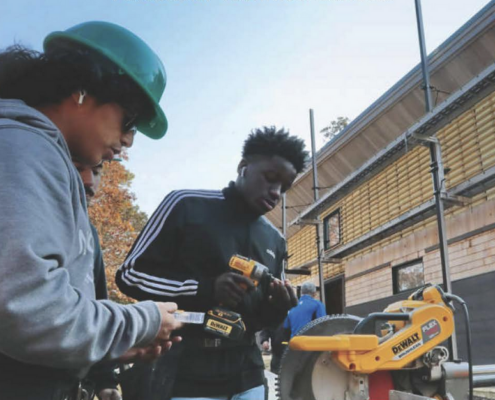
Stanford’s Arnold Rampersad on Jackie Robinson
Stanford University Prof. Arnold Rampersad, author of Jackie Robinson: A Biography, discusses the life and legacy of Robinson, the hall of fame baseball player and history-changing civil rights leader.

Pulitzer Winner Kai Bird on Robert Oppenheimer & the Atomic Bomb
Mr. Bird focuses on the life and legacy of J. Robert Oppenheimer, “father of the atomic bomb.” He discusses Oppenheimer's impact on history, his early life and education, and his academic achievements in quantum physics. Bird covers Oppenheimer's political views, relationships, as well as his leadership in the Manhattan Project and his role in the Trinity test.

Georgetown’s Dr. Marguerite Roza on Federal ESSER Funds & the Fiscal Cliff
Dr. Roza explores the complexities of education finance and its impact on American K-12 education. She outlines the three phases of school funding over the past 40 years and their effect on equity and student achievement. She highlights that only about half of the K-12 education dollars reach student instruction, with significant funds absorbed by the ever-expanding education bureaucracy.

Steven Wilson on Charter Public Schools
Mr. Wilson delves into his extensive background, including his tenure at Pioneer Institute, his work with Governor Bill Weld, and his contributions to the landmark 1993 Massachusetts Education Reform Act. Steven shares insights into the high academic expectations and success of Boston's charter schools, emphasizing the importance of recruiting and retaining quality teachers and principals.

Sheldon Novick on Henry James, American Women, & Gilded-Age Fiction
Mr. Novick discusses the complexities of Henry James’ life and writing career, highlighting his significant literary contributions, the influence of his family's intellectual legacy, and the realistic portrayal of social tensions in his works. Novick explores Henry James’ life experiences that shaped his novels like The Portrait of a Lady and The Golden Bowl.

USAF Academy’s Jeanne Heidler on Henry Clay & Congressional Statesmanship
Dr. Heidler discusses Henry Clay's legacy as a seminal figure in American history. She covers Clay's early life, his transformation from a Virginia farm boy to a leading statesman, and his being mentored in the law by Founding Father, George Wythe.
 https://pioneerinstitute.org/wp-content/uploads/TLC-Shiloni-05292024-767x432-1.png
432
767
Editorial Staff
https://pioneerinstitute.org/wp-content/uploads/logo_440x96.png
Editorial Staff2024-05-29 16:14:072024-05-29 16:27:34Israeli Harvard Student Maya Shiloni on Campus Antisemitism
https://pioneerinstitute.org/wp-content/uploads/TLC-Shiloni-05292024-767x432-1.png
432
767
Editorial Staff
https://pioneerinstitute.org/wp-content/uploads/logo_440x96.png
Editorial Staff2024-05-29 16:14:072024-05-29 16:27:34Israeli Harvard Student Maya Shiloni on Campus Antisemitism
Kimberly Steadman of Edward Brooke on Boston’s Charter School Sector
Steadman reflects on her educational background and leadership in urban charter public schools. She discusses the importance of rigorous academic expectations for K-12 students, and how this outlook influences her educational philosophy co-directing the Brooke charter school network. Ms. Steadman shares the challenges faced by Massachusetts charters due to the post-2016 ballot loss, and how she and other charter public school leaders advance supportive policy reforms.

Cheryl Brown Henderson on the 70th Anniversary of Brown v. Board of Education
Cheryl Brown Henderson, daughter of the lead plaintiff in the landmark U.S. Supreme Court decision, Brown v. Board of Education, explores her family's pivotal role in the Brown case, detailing her father’s part within the NAACP's wider legal strategy.

POLITICO’s Peter Canellos on Justice John Marshall Harlan & Plessy v. Ferguson
Mr. Canellos delves into Harlan's upbringing in a prominent slaveholding family, his Civil War service in the Union Army, and his rapid rise in Kentucky politics as a Republican. He highlights John Harlan’s mixed-race half-brother Robert Harlan and key legal precedents like the notorious Dred Scott v. Sandford (1857), which influenced Harlan's views on race and equality.

Study: Expand Voc-Tech Seats, Don’t Require Lottery- Based Admissions
Bottom line is that demand for career vocational-technical…

39th U.S. Poet Laureate Robert Pinsky for National Poetry Month
Boston University professor, Robert Pinsky discusses his memoir Jersey Breaks: Becoming an American Poet; the enduring influence of sacred texts like the Psalms; and the wide cultural significance of classic poets like Homer and Shakespeare.

U.S. Chamber Foundation’s Hilary Crow on K-12 Civics Education
U.S. Chamber Foundation VP, Hilary Crow discusses the state of K-12 civics, emphasizing the Chamber Foundation’s role in addressing America’s wide civic education deficits. Crow highlights a recent national civics survey, alarming civic literacy gaps, and links between political unrest and our nation’s educational shortcomings in K-12 civics.

UCLA’s Ronald Mellor on Tacitus, Roman Emperors, & Despotism
Dr. Mellor delves into the enduring influence of Tacitus, the great Roman historian, on both America’s Founding Fathers and contemporary understanding of politics and government. He discusses Tacitus's insights on the early Roman emperors, unchecked authority, moral judgment of leadership, and the decline of the Roman Republic, as well as ancient lessons for modern governance.

Tufts Prof. Elizabeth Setren on METCO’s Proven Results
Prof. Setren discusses her recent study of METCO, a pioneering voluntary school desegregation program under which Massachusetts students in Boston and Springfield are bused to surrounding suburban districts. She discusses METCO's history, the academic performance of students in the program, enrollment challenges, long-term benefits, and disparities among students.

Pulitzer Winner Joan Hedrick on Harriet Beecher Stowe & Uncle Tom’s Cabin
Prof. Hedrick discusses Harriet Beecher Stowe's wide literary influence on U.S. history. From her abolitionist activism to the publication of international bestseller Uncle Tom's Cabin, they explore Stowe's New England upbringing, anti-slavery convictions, and lasting impact on American literature and social reform in the 19th century.

Dr. Adrian Mims on The Calculus Project & STEM
Dr. Mims navigates through the contentious "math wars" and underscores the pivotal role of Algebra I as a gateway to higher math. He also evaluates the negative impact of Common Core math standards, and proposes strategies to combat pandemic-induced learning setbacks and bridge the gap in math proficiency between American students and their international counterparts.

Yale University Pulitzer Winner Beverly Gage on J. Edgar Hoover & the FBI
Yale Prof. Beverly Gage, author of "G-Man: J. Edgar Hoover and the Making of the American," delves into the enigmatic life and career of J. Edgar Hoover, tracing his formative years in Washington, D.C., his rise to prominence as director of the FBI, and his enduring influence on American law enforcement and politics.

Study: Ed Reform Has Improved Academic Performance and Equity
Over the past 30 years, rigorous standards, assessments, and accountability for outcomes have propelled Massachusetts public schools to become the nation’s best. Taking away the high-stakes component of MCAS would weaken the accountability system and lead stakeholders to de-emphasize the assessment data that drives high-quality instruction, according to a new study published by Pioneer Institute.

UK U-Warwick’s Benjamin Smith on Mexico’s Cartels & Drug Trade
Prof. Benjamin Smith, author of The Dope: The Real History of the Mexican Drug Trade, provides insights into various aspects of the Mexican drug trade, including its historical context and the evolution of illicit drug products over time. He discusses key cartels and their methods, the impact of the drug trade on Mexico's murder rates, the immense financial scale of the trade, its effect on Mexico and the U.S., and the challenges law enforcement face in combating it. Smith explores the relationship among Mexican cartels, other foreign countries, and the illicit drug market in the U.S.

DFER-MA’s Mary Tamer on MCAS & Teacher Strikes
Mary Tamer focuses on the historic impact of the 1993 Massachusetts Education Reform Act on the commonwealth’s students’ high achievement on national and international measures. She explores the politics of the Massachusetts Teachers Association advocating against the MCAS test as a graduation requirement. In closing, Ms. Tamer also discusses the rise of teacher strikes and their implications for education reform in the Bay State.

U-TN’s Robert Norrell on Booker T. Washington & Voc-Tech
Prof. Robert Norrell explores Booker T. Washington's early life in slavery, his transformative leadership at Tuskegee Institute amidst Jim Crow racism, and his advocacy for vocational education as a means for racial uplift. He also discusses Washington’s 1901 autobiography, Up From Slavery; his controversial White House dinner with President Theodore Roosevelt; and his often overlooked legacy following the activism of the 1960s Civil Rights era.

BC’s Dr. Matthias von Davier on TIMSS & K-12 Global STEM
Dr. von Davier explores his educational background and its influence on directing TIMSS & PIRLS, shedding light on psychometrics and standardized testing. He discusses the shift in education policy's focus, the global education data landscape, and the pandemic's effects on K-12 education around the world. Dr. von Davier addresses the alarming decline in U.S. educational performance, emphasizing the urgency to bridge achievement gaps. Drawing from international experiences, he highlights global examples for American policymakers from higher-performing countries, emphasizing the crucial links between education, skills, and innovation on the global economy.

Admissions lotteries would harm vocational-technical schools
Expanding the number of seats available in vocational-technical high schools is a good investment for Massachusetts. But it’s critical they are expanded in a way that promotes equity without endangering the academic and occupational excellence that continues to drive burgeoning demand for these schools.

ExcelinEd’s Dr. Cara Candal on National School Choice Week
Dr. Candal delves into the evolving landscape of K-12 education in the U.S., examining the expansion of private school choice programs post- U.S. Supreme Court decisions, changing political dynamics around charter schools, strategies of the national school choice movement in low-performing states, the role of parent-driven models during the pandemic, the significance of voc-tech education, and addressing underperformance and achievement gaps.

NYT Bestseller Jonathan Eig on the Rev. Dr. Martin Luther King, Jr.
Jonathan Eig delves into MLK's early spiritual leadership, the influence of Langston Hughes on his speeches, his relationship with his wife, Coretta Scott King, and the Southern Christian Leadership Conference's challenges. He discusses historic events in Birmingham, Alabama, the March on Washington, MLK's struggles in Chicago, the Poor People's Campaign, and the events leading to his assassination in 1968. Eig underscores the multifaceted aspects of MLK's life and provides insights on drawing lessons for contemporary challenges in race relations and leadership.

Olympic Track Medalist Gabby Thomas
Gabby Thomas, Pioneer Valley native, Harvard alum in neurobiology, and Olympic sprinter, won bronze and silver in Tokyo, she also pursued a master's in epidemiology. She shares her journey excelling both in academics and athletics.

Two Time Pulitzer Winner T.J. Stiles on Cornelius Vanderbilt & American Business
T.J. Stiles delves into the life of America’s first tycoon, Cornelius Vanderbilt, exploring his rise to historic wealth in steamboats, shipping, and railroads. He discusses Vanderbilt's legal battles, philanthropy, and enduring legacy, exploring his business competitiveness and wide impact on 19th-century America’s economy.

Smith College’s Carol Zaleski on The Lord of the Rings & Narnia
Prof. Carol Zaleski discusses the literary impact of the Inklings, focusing on J.R.R. Tolkien and C.S. Lewis, exploring their lives, works, and enduring moral contributions in today's cultural landscape.

Emily Hanford on Reading Science & K-12 Literacy
Emily Hanford, host of the hit podcast Sold a Story: How Teaching Kids to Read Went So Wrong, discusses the science of reading, the long whole language v. phonics debate, the impact of the digital age on learning, and the importance of academic background knowledge for children becoming better readers.
